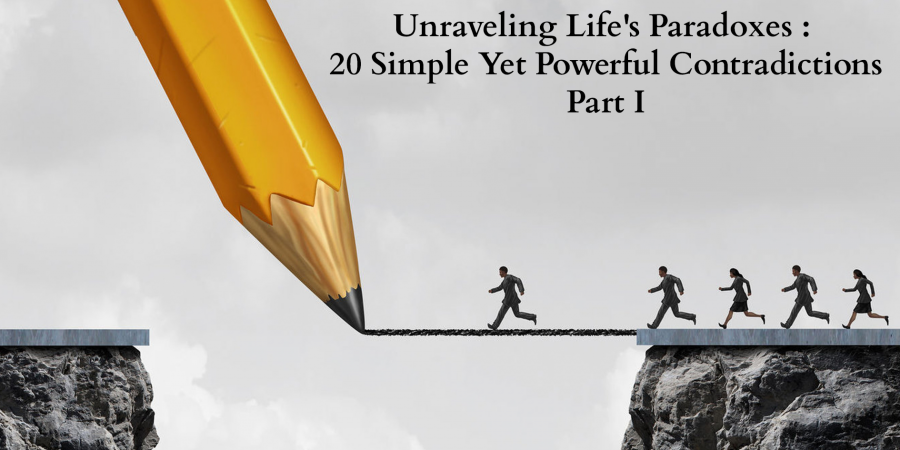

Life is a tapestry woven with paradoxes, simple truths wrapped in layers of complexity. These paradoxes often challenge our understanding of the world and ourselves, revealing profound insights when explored. In this, we delve into 20 of life's most powerful paradoxes, distilling them into simple language and offering examples that illuminate their significance. From the duality of control and surrender to the balance between love and fear, these paradoxes invite us to contemplate the deeper mysteries of existence.
A. The Paradox of Control and Surrender : The more we try to control life, the less control we have. Conversely, surrendering to the flow of life often brings about a sense of empowerment and freedom.
Example : Letting go of the need to control outcomes in a relationship can lead to deeper connection and trust.
B. The Paradox of Strength and Vulnerability : True strength lies in vulnerability, as it requires courage and authenticity.
Example : Opening up about our struggles can foster genuine connections and support.
C. The Paradox of Change and Stability : Life is in a constant state of flux, yet stability is found in embracing change.
Example : Embracing new experiences and challenges leads to personal growth and resilience.
D. The Paradox of Giving and Receiving : The more we give, the more we receive, creating a cycle of abundance.
Example : Volunteering not only benefits others but also brings fulfillment and joy to the giver.
E. The Paradox of Unity and Individuality : We are both interconnected with all beings and unique individuals with our own identities.
Example : Recognizing our shared humanity while celebrating our individuality fosters empathy and understanding.
F. The Paradox of Acceptance and Ambition : Contentment with the present moment coexists with a drive for self-improvement and growth.
Example : Embracing gratitude for what we have while pursuing our aspirations leads to a balanced and fulfilling life.
G. The Paradox of Joy and Suffering : Joy can be found amidst suffering, offering moments of grace and resilience. Example: Finding beauty in nature's simplicity during challenging times brings solace and peace.
H. The Paradox of Freedom and Responsibility : True freedom is found in embracing responsibility and accountability for our actions.
Example : Choosing to act with integrity and compassion empowers us to shape our own destiny.
I. The Paradox of Knowledge and Ignorance : The more we learn, the more we realize how much we don't know, humbling us in the face of life's mysteries.
Example : Embracing a curious mindset opens us to new perspectives and endless possibilities.
J. The Paradox of Time and Presence : While planning for the future is important, true fulfillment is found in being fully present in the moment.
Example : Engaging in mindful practices such as meditation helps cultivate awareness and appreciation for the present.
